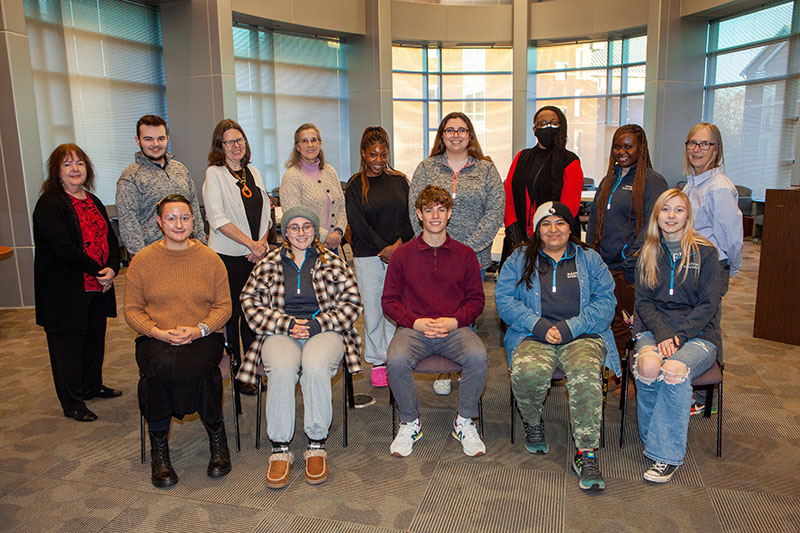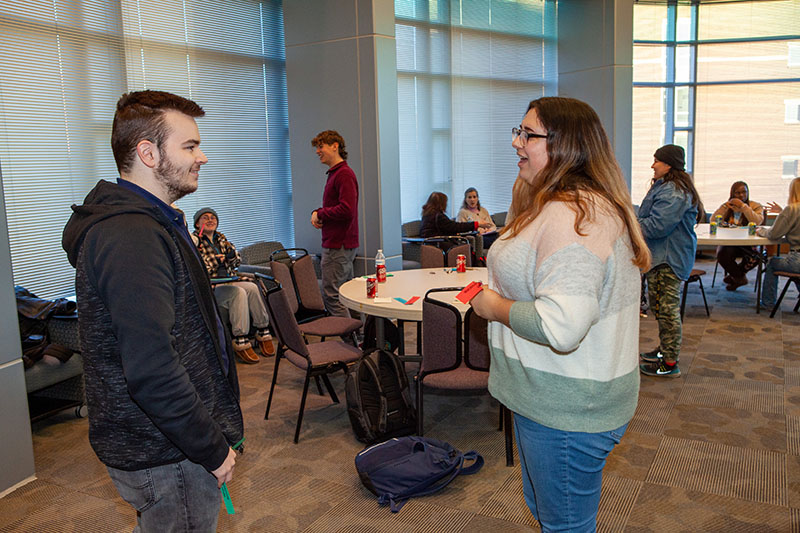- Apply
- Visit
- Request Info
- Give



Published on January 24, 2023

Eleven students in the National Science Foundation-sponsored Success Scholar program at Eastern Connecticut State University are pairing with faculty and student mentors in a four-year effort to prepare for careers in science.
The National Science Foundation (NSF) awarded Eastern a grant of nearly $650,000 in 2021 to implement a scholarship program for lower-income students pursuing science-related careers. Each scholarship is worth $9,750 per year for four years. The grant will run for about five years, and the program recently completed its second year.
"Many lower income students are from underrepresented groups, and often are the first in their family to attend a university," said Barbara Murdoch, associate professor of biology and director of the Success Scholars program. To become Success Scholars, students must intend to pursue science-related careers, demonstrate a financial need, have a high school GPA of at least 3.4 and plan to major in biology or mathematics. The GPA requirement can be adjusted if students show academic potential through their personal essay, recommendation letter and experiences.

There are 11 students in the program--nine biology majors and two mathematics majors. It has two cohorts. “The first cohort of four is in their second year of the program; the second cohort of seven is in their first year of the program,” said Murdoch. “Each cohort consists of students that who are either first-year students or sophomores.”
A series of developments has taken place in the program since its inception. First, most students entering the program have taken a First-Year Introduction (FYI) course titled, “Science vs. Pseudoscience.” Three faculty members associated with the grant teach this course: Murdoch, Elizabeth Cowles (biology), and Laura Rodriguez (education).
“This has been a wonderful synergy between faculty from different departments and with different perspectives, working collaboratively to support our students,” said Murdoch.
Scholars are also paired with a faculty mentor in their major for advising. This provides a solid connection between scholars and faculty members who can help them to achieve success throughout their undergraduate years. Murdoch is the mentor for biology scholars.
Also part of the program is peer mentoring, headed by Professor Kim Ward (mathematical sciences). In this case, other students are hired as mentors to provide the scholars with academic and psychosocial support. Meetings between mentors and mentees occur almost weekly.
One peer mentor is Billi Kozak, a junior biology major. Kozak enjoys helping scholars find someone they can relate to. “It’s like seeing me when I was younger and being able to give myself all the tips and advice I wish I knew then,” they said.
Success Scholar Brycen Kennedy, a sophomore biology major, appreciates the assistance of peer mentors and faculty mentors. “The program has integrated me into a community of like-minded and ambitious scholars who have spent their life in these fields,” he said.
Kennedy believes that the guidance of these mentors is preparing him for a STEM-related career as well as enhancing his student experience. “They have given me so many important tips and tricks to being a student that I wouldn’t have known prior,” he said. “I've learned ways to cope with stress and do work more efficiently due to them, and it has totally empowered me to strive for greatness while taking care of myself.”
Every four weeks, the program holds a seminar. Speakers in STEM fields are invited to share their research and career trajectories. Student interest in seminar topics is high, as most seminars to date have been well-attended by both NSF scholars and other students.
According to Kozak, listening to these guest speakers “makes the future seem a bit less scary when people have dipped their feet in the water and came out with a beautiful story, whether or not their research went as planned.”
Several scholars in the program are also taking part in a research study by Rodriguez, the program’s science education research specialist. These students have volunteered to offer information regarding the effectiveness of the program and how they view themselves within the STEM community.
In all, the program’s lead faculty members include Murdoch; Cowles; Ward; Rodriguez; Carmen Cid, dean emerita of Arts and Sciences; and Emily Todd, dean of Arts and Sciences. The first cohort consists of students Kennedy, Marissa Paquette, and Drizzly Bello, while the second cohort includes students Caleb Hall, Josephine Loforte, Habigaelle Jean and Sarah Grant. Peer mentors include Kozak and Aretha Kassegnin.